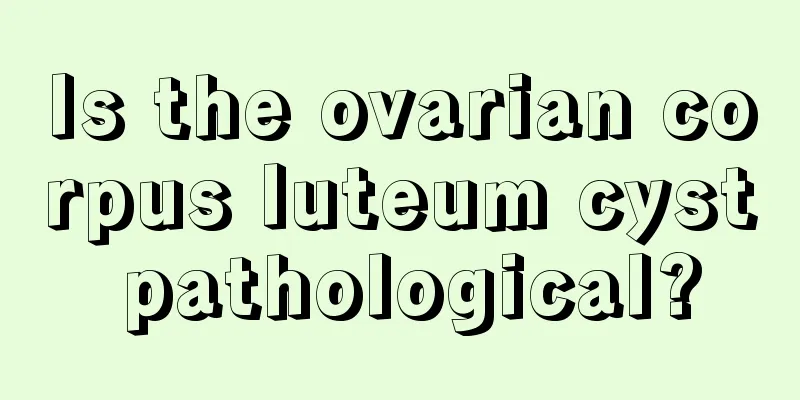Is the ovarian corpus luteum cyst pathological?

|
The corpus luteum of the ovary is the most obvious physiological feature. It is formed after ovulation. If you do not get pregnant, the life span of the corpus luteum generally lasts 14 days and disappears with the passage of time. Many people will find symptoms of cysts in their ovaries. Some people will find out that they have corpus luteum cysts in their ovaries after examination. Physiological corpus luteum cysts are normal, and pathological corpus luteum cysts require timely examination and treatment. The corpus luteum of the left ovary is considered to be a physiological ovarian cyst Ovarian cysts are divided into physiological cysts and pathological cysts. Physiological cysts generally have no special symptoms and most of them can disappear on their own. The ovaries of women of childbearing age ovulate almost every month, and a corpus luteum is formed after ovulation. If pregnancy does not occur, the life span of the corpus luteum is generally 14 days, at which time it should normally atrophy and disappear. However, if the corpus luteum does not successfully die, or even if there is a small amount of bleeding and further fluid accumulation, a corpus luteum cyst will form. If pregnancy occurs, it can continue to exist for about 6 weeks, and clinically it will look like an ovarian cyst, so there is no need to worry about it. Another type of functional cyst is the follicular cyst, which is caused by the follicle continuing to grow without ovulation, eventually forming a cyst with clear serous fluid in the middle. The above types are all physiological cysts. Pathological cysts. Small cysts are mostly asymptomatic and can usually only be discovered during physical examinations. When the cyst is of medium size, the patient will feel abdominal distension and a lump can be felt in the lower abdomen. When the cyst is too large, compression symptoms may occur, such as frequent urination, constipation, palpitations, shortness of breath, etc. When complications such as infection occur, symptoms such as abdominal pain will occur. In addition, menstrual disorders and endocrine disorders are also symptoms associated with ovarian cysts. |
<<: What should I do if I have cysts during pregnancy? It is important to find out the condition!
>>: What is a simple and effective way to delay menstruation?
Recommend
What is the fastest and most effective way to stop breastfeeding?
1. Quick weaning: If you have made adequate prepa...
First prenatal check-up time
I believe that everyone should have seen people a...
What are the symptoms of multiple ovarian cysts?
When women reach middle age or old age, they begi...
What is the difference between hip and waist?
First of all, how to calculate the hip circumfere...
Is it normal to have frequent fetal movements at 29 weeks of pregnancy?
Baby movement refers to the activities of the fet...
What does the black line on a woman's belly indicate?
Pregnancy makes every woman go through an unprece...
Is it ok to drink lemon water overnight? Why does drinking lemon water make you get angry?
Lemon water can not only improve loss of appetite...
Unexpected pregnancy during the 9-valent vaccine
As we all know, it would be a happy thing if we c...
What are the nutritional values of duck blood vermicelli soup? Who is suitable for duck blood vermicelli soup?
Duck blood is a "scavenger" of human wa...
Many people may eat these 5 foods that are most harmful to the liver every day! Many people don’t pay attention to the third one
Staying up late, alcohol, takeout, stress... The ...
When is the best time to have an abortion?
As people in modern society face increasing econo...
Princess Taiping's 6 major health crises
1. Susceptible to breast diseases Women with thin...
Things to note when staying in a hotel for girls
People living in big cities may have had the expe...
Why does my baby always hiccup when I am eight months pregnant?
From the first month of pregnancy to the middle a...
A 62-year-old famous singer accidentally fell during a concert. It turns out that many people suffer from the same disease as him!
The day before yesterday (August 14) #Jacky Cheun...



![[Women's Day] Popular Science: Caring for "Her" Health: How Much Do You Know About Breast Cancer?](/upload/images/67f159164a9d2.webp)





